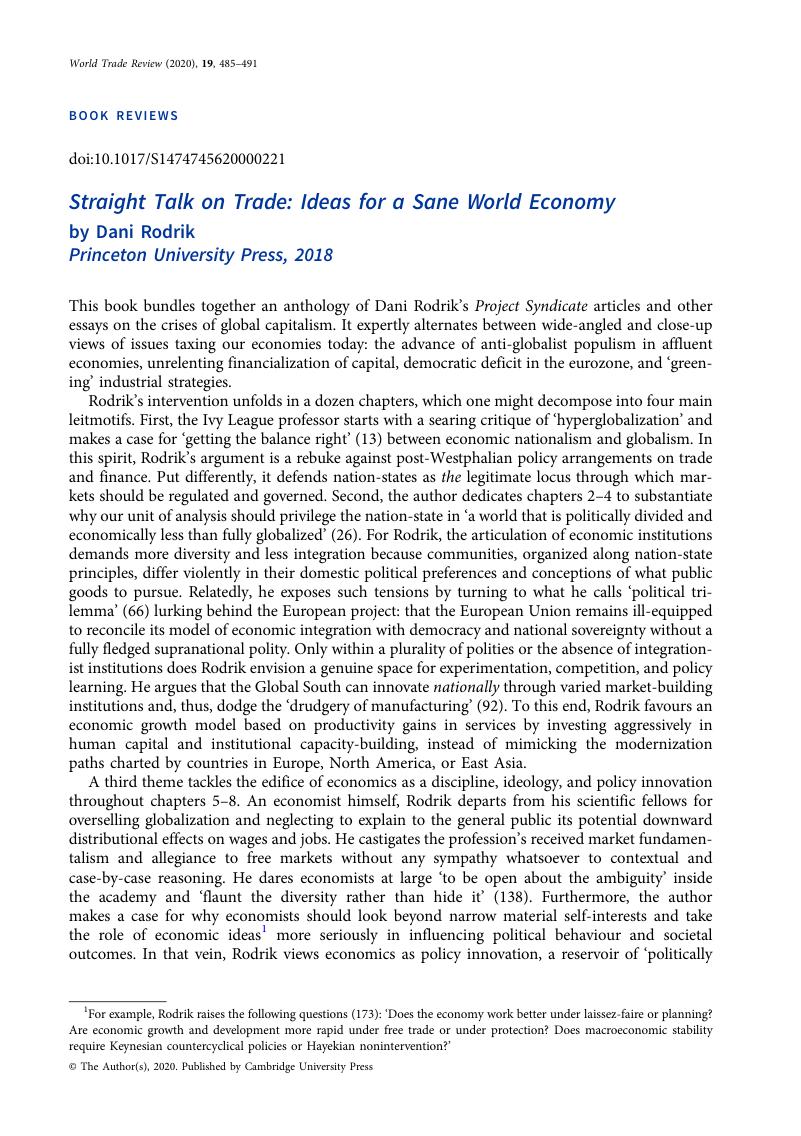No CrossRef data available.
Published online by Cambridge University Press: 29 May 2020

1 For example, Rodrik raises the following questions (173): ‘Does the economy work better under laissez-faire or planning? Are economic growth and development more rapid under free trade or under protection? Does macroeconomic stability require Keynesian countercyclical policies or Hayekian nonintervention?’
2 The author cites, inter alia, the decision of the Japanese ruling class to promote industrialization and economic development in the post-Meiji restoration period (185) and the Chinese invention of special economic zones to participate in the global economy without full liberalization and whilst protecting state-owned enterprises (187).
3 Mazzucato, M. (2013) The Entrepreneurial State: Debunking Public vs. Private Sector Myths. London and New York: Anthem Press.
4 Evans, P. (1995) Embedded Autonomy: States and Industrial Transformation. Princeton, NJ: Princeton University Press.
5 Stiglitz, J. and Charlton, A. (2005) Fair Trade for All: How Trade Can Promote Development. Oxford and New York: Oxford University Press; Stiglitz, J. (2003) Globalization and its discontents. New York and London: W.W. Norton & Company Ltd.
6 Streeck, W. (2014) ‘How will capitalism end?’ New Left Review 87: 35–64.
7 Gil-Pareja, S., Llorca-Vivero, R. and Martinez-Serrano, J.A. (2017) ‘The Effect of Nonreciprocal Preferential Trade Agreements on Benefactors’ Exports’. Empirical Economics 52(1): 143–154; Herz, B. and Wagner, M. (2011) ‘The Dark Side of the Generalized System of Preferences’. Review of International Economics 19(4): 763–775.
8 European Commission (2018) Mid-Term Evaluation of the EU's Generalised Scheme of Preferences (GSP). https://trade.ec.europa.eu/doclib/docs/2018/October/tradoc_157434.pdf.
9 Young, A. (2015) ‘Liberalizing trade, not exporting rules: the limits to regulatory co-ordination in the EU's “new generation” preferential trade agreements’. Journal of European Public Policy 22(9): 1253–1275.
10 Meissner, K. and McKenzie, L. (2019) ‘The paradox of human rights conditionality in EU trade policy: when strategic interests drive policy outcomes’. Journal of European Public Policy 26(9): 1273–1291.
11 Hall, P. (2016) ‘The Euro Crisis and the Future of European Integration’. In Search of Europe. Madrid: BBVA, 47–67.
12 Wainright, J. and Mann, G. (2013) ‘Climate Leviathan’. Antipode 45(1): 1–22.